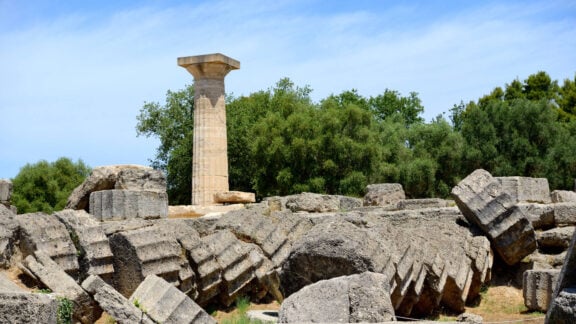It is a fitting occasion, as an Australian of Greek Cypriot origin, to lament the current and enduring historical demise of our beautiful Mediterranean island of Cyprus.
The recent financial restrictions on deposit withdrawals in the two main banks of Cyprus; the Bank of Cyprus and Laiki Bank, have brought to light the frail nature of its state and economy.
Seeking desperate stimulus after the tragic Turkish invasion in 1974, which divided the island, the Greek Cypriots set out to attract money and investment to the island by offering very attractive company tax rates; up to 10 per cent. Australia has a 30 per cent flat company tax rate. After the collapse of Communism this attracted billions of dollars in deposits from Russian and Eastern block individuals and companies, who were looking for a safe haven to deposit their money. It also stimulated a flurry of foreign companies who would register in Cyprus to benefit from these low tax rates. As I visited over the years, I watched the growth of the big international accounting firms adorning the skylines of the coastal towns of Limassol, Larnaca and the capital city of Nicosia. This created employment for many of the young Greek Cypriots who studied overseas and would return as qualified accountants, many with Masters, to take up positions in the numerous financial advice and accounting firms which had mushroomed everywhere.
With the opening of borders between the occupied Turkish North and the Greek Cypriot South, I travelled from the south to the north and soon realised how prosperous the south was in comparison. It was this prosperity which qualified the Greek Cypriot South to join the eurozone. After the war in 1974 the Greeks felt vulnerable and insecure with the presence of 40,000 Turkish troops on the island protecting the now occupied Turkish North, and there was a real sense of urgency to put this insecurity to rest by campaigning to become members of the European Union. The Greek Cypriot South finally became members of the EU in 2003 and joined the common currency eurozone in 2008. They now felt their safety and security from any further Turkish invasion was guaranteed. However, the effects of being part of a greater global trading system such as the European Union were soon to be realised by the Greek Cypriots. Although financial benefits were received, their agricultural trade, which was traditionally the backbone of the Cypriot economy, was now being curtailed. No longer could our relatives, who grew and harvested grapes for decades, if not centuries, rely on the sale and export of their produce. These markets were now closed to the Cypriots as the EU had sourced other suppliers. As I drove through the beautiful villages of southern Cyprus in 2011, the once lush green vines dripping with grapes which covered the hills were now withered and left to die.
Sadly, there has been a similar demise for much of the agricultural produce of the island. Cypriots, as a result of joining the EU eurozone, were now forced to rely on tourism and the financial services industry to generate growth and employment. Along with other southern European countries such as Greece, Italy and Spain, Cyprus is suffering. It is locked into an inflexible currency system which is tearing at the heart of its economy and society. It seems to me, designers of the rules and regulations of the European Union did not prepare nor foresee such tragic outcomes which explains why they are struggling to resolve the current financial problems of the eurozone.
Greek Cypriots now have a long and difficult road ahead before they see recovery. Changes need to be made to their revenue raising systems and officials who were in positions of authority need to be held accountable for the collapse of the banking system.
Good corporate governance is the essence of a sound political and economic system and any nation or banking system can suffer the same disastrous outcome if diligence is not employed. We’ve seen it happen recently in America with the subprime mortgage saga and the collapse of numerous banks.
On a more personal note, I am forever saddened by the lack of political effort by all political powers involved to bring unity to the divided island after 38 years since the war. Cypriots sought safety and refuge by joining the EU but instead they are left to endure even more hardship and turmoil.
* Georgina Demetriou was a Corporate Governance lecturer at Swinburne University of Technology.
Advertisement
Cypriot tax haven spoils long gone
Cypriots sought safety and refuge by joining the EU but instead they are left to endure even more hardship and turmoil






